Cross‑Border Data Transfers: Navigating India’s DPDPA
India’s Digital Personal Data Protection Act (DPDPA) 2023 brings new clarity to how organizations handle personal data, especially when it leaves India’s borders.

Some global laws that limit where personal data can go such as EU’s GDPR only allows data transfers to countries with adequate protection, but the DPDPA offers more flexible approach. Like it says cross-border transfers are permitted to any country unless there any specific restrictions by the Indian government. Which means by default businesses can transfer personal data internationally unless there is restriction on the destination country by the Indian government.
1. Transfers Are Allowed, But Not Free from Accountability
Even though data can be transferred freely, but businesses still have to follow all the rules of DPDPA. Wherever the data goes doesn’t matter, but the key principles like using data only for specific purposes, collecting only what’s needed and keeping it secure will always applies.
2. Get Clear, Informed Consent
According to the DPDPA, the users must have to be known where there data is being sent. And especially when the data is transferred to another country. They need to know this before they give their consent.
3. Keep Strong Vendor Contracts
Whenever there are any contracts involved such as any cloud providers or partners outside India, then these contracts must keep the data safe. And these contracts should include things like quick reporting of data breaches and following India’s data protection rules, as well as the good security. It’s like the vendors agree to handle the data as if your own company were handling it securely.
4. Monitor Government Notifications
The Indian government might ban the data transfers to some countries in the future. Now, there is no such list, eventually the list might change. So, keep tracking the latest updates about these changes and should be ready to stop transfers or change the vendors quickly if required.
Complaint to DPDPA’s cross-border rules isn’t just a legal formality, but it is more about showing your customers that you are protecting their data securely. Here are some of the key steps:
- Map Your Data Flows: Track the personal data like where the data is being stored and who can see it and which countries does the data goes to. So that it will helps you to understand your risks and what you need to do to stay compliant.
- Strengthen Your Vendor Due Diligence: Before any company begin working with any outside India, it is suggested to ask the important questions. Like do they follow the trusted security standards?
- Build Response Plans for Policy Shifts: It is an individual responsibility and necessity to act immediately if the government restricts the destination country. It is suggested to implement or set up the internal procedures to handle any future changes smoothly.
Complying to the DPDA is not just about avoiding the penalties, but it shows that your organization cares on how responsibly data is being transparent, data handling and qualities that matter to your partners and stakeholders.
Adopting responsible cross-border data transfer practices can:
- Earn customer trust by respectful with their data and being clear.
- Build stronger global partnerships on how you manage data well.
- Protect your brand to avoid data leaks and violating the rules.
- Reduce risks to handle the data across different countries.
India’s DPDPA offers flexibility in cross-border data transfers, but organizations must stay careful. Companies that align with both the rules and the purpose behind them will not only comply, but also stand out as strong trusted leaders in the privacy focused marketplace.
Getting DPDPA compliance right isn’t just about ticking boxes, it’s about understanding how the law applies to your specific business and putting practical systems in place. That’s where Azpirantz can really make a difference.
Our team works closely with organizations to simplify complex privacy requirements and build solutions that actually work in real-world scenarios. From setting up consent flows to preparing for audits, we help you stay compliant without slowing down your operations.
Need support getting started?
Explore India DPDPA Consulting Services
We're Here To Help